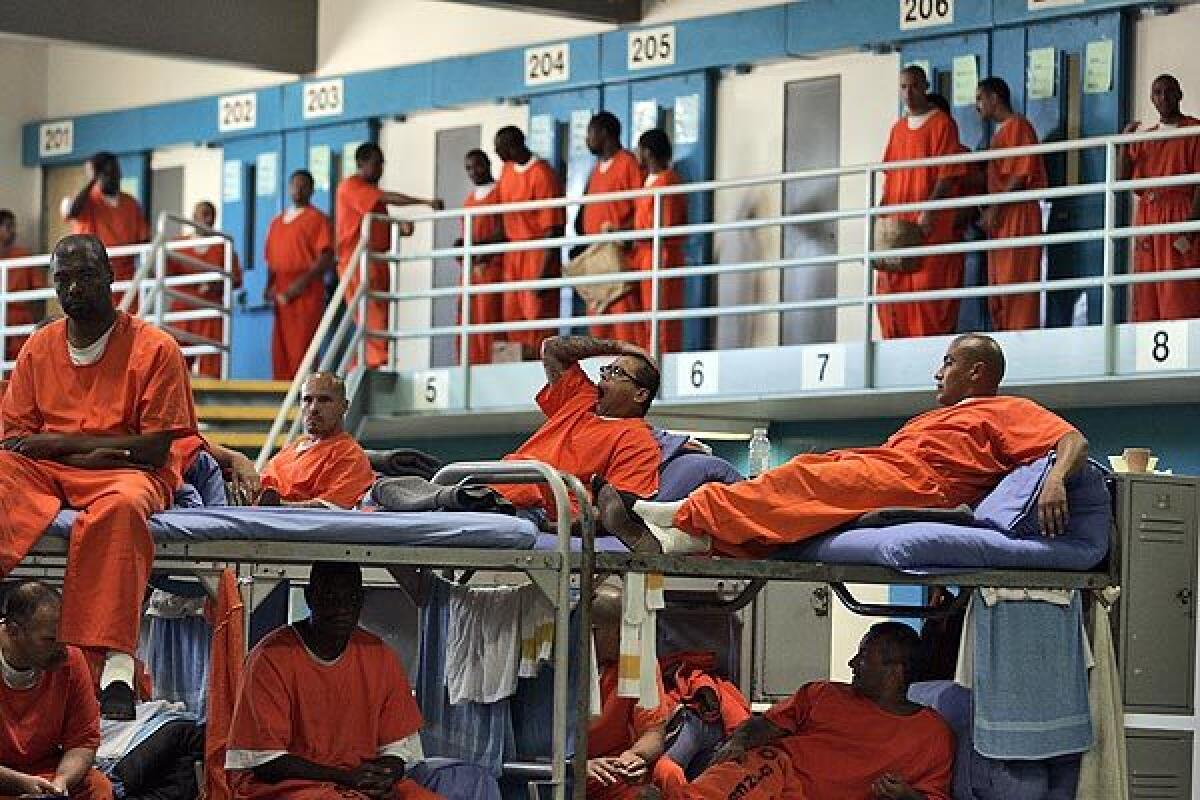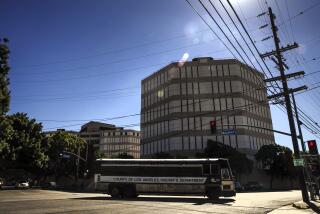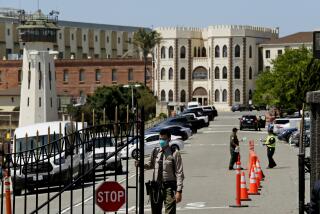First inmate in California’s prison system tests positive for coronavirus

- Share via
The first inmate within California’s prison system has tested positive for COVID-19.
The prisoner is at California State Prison, Los Angeles County, state corrections officials announced on Sunday night.
The officials also said that five prison workers have COVID-19, the disease caused by the novel coronavirus. Two are at California State Prison, Sacramento, outside of Folsom; one is at Folsom State Prison; and two are at the California Institution for Men in Chino.
The prisoner in L.A. County was in stable condition and being treated on site, according to a statement from the California Department of Corrections and Rehabilitation. The department said the prisoner reported feeling unwell and was put into isolation Thursday, was tested Friday, and the results came back Sunday. The agency would not provide information on the health of the infected workers.
The prisoner’s movements will be restricted while an investigation into who might have had contact with him is underway. Those deemed at-risk will be quarantined for observation, the department said.
In a joint statement, the department and the state’s prison health care agency said they “remain agile in response to any potential case of COVID-19 ... with the top priority being the safety and protection of staff, the population, volunteers, visitors and surrounding communities.”
California already has halted visitation, prison volunteer programs and educational activities, and has started screening staff. However, anxiety has continued to grow for both prisoners and those working in the state’s prisons.
“We all hope and pray they do something,” one inmate wrote anonymously to the Los Angeles Times. “We’re all scared ... We’re all sitting waiting for this silent killer to come and [the Department of Corrections] to lock us away in cells and pass the buck. It’s a weird feeling around these walls right now.”
A prison nurse working in a housing unit where a number of patients are under “COVID surveillance rounds” voiced similar concerns.
“It is very unnerving,” she told The Times, insisting on anonymity. “There is so much close interaction with staff and inmates.”
Also on Sunday, the department released treatment and testing guidelines for COVID-19. They call for all prisoners with influenza-like symptoms to be tested; during flu season, prison doctors have the option of testing prisoners for flu first and then for the novel coronavirus if the initial test comes back negative.
Priority for testing for the coronavirus is given to prisoners who are 60 or older, have chronic health conditions or have compromised immune systems. The department would not provide the number of prisoners who have been tested for the virus so far, or the number of prisons with locked-down units because of possible cases.
In general, there has been a shortage of tests, both across California and nationwide, making it difficult to know precisely how many people have contracted the virus.
The corrections department’s guidelines describe steps to avoid spreading the coronavirus through the close confines of prison: “Close as many affected buildings/units as needed to confine the outbreak. Remind patients not to share eating utensils, food or drinks. Stop large group meetings such as religious meetings and social events.”
Last week, a federal judge ordered the creation of a task force to report within a week on plans to combat COVID-19 within the prison system. A lawyer on the task force who represents mentally ill inmates said the judge required that population reduction be among the issues discussed.
The task force began meeting Saturday.
California’s prisons are currently at 134% of their capacity. The prison in Los Angeles County is at nearly 140% capacity, with some 3,200 prisoners, though it was designed for 2,300.
Medical services in most California prisons are overseen by a court-appointed special master because of decades of overcrowding and substandard care. However, improvements have allowed the state to regain control of health care in a number of prisons.
More to Read
Sign up for Essential California
The most important California stories and recommendations in your inbox every morning.
You may occasionally receive promotional content from the Los Angeles Times.











